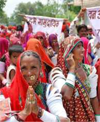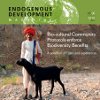Raikas demand grazing rights in forest land

Raika pastoralists in Rajasthan, India, have protested against restrictions to their grazing rights.
Traditionally, the Raikas would graze their sheep, goats and camels in the forest during the monsoon season, when crops are growing in the fields. After the harvest, they would lead their animals to graze on the stubble, fertilizing the soil on the crop fields.
But the designation of large areas of forest as nature reserves means that the Raika have nowhere to go.
The Raika cite international law as supporting their case: the Convention on Biological Diversity requires India to “respect, preserve and maintain knowledge innovations and practices of indigenous and local communities embodying traditional lifestyles relevant for the conservation and sustainable use of biological diversity”.
Hundreds of Raika staged a demonstration in Sadri, Rajasthan, in July to draw attention to their case. The protest attracted national press coverage. See www.hindu.com for more.
German sheep marathon in Brussels on 17 September

A four-country sheep trek across Europe to draw attention to the role of mobile herding in maintaining biodiversity and grassland will arrive in Brussels on 17 September 2010.
The shepherds and their animals were due to arrive in the European capital one day earlier, but have delayed their arrival so they can meet with members of the European Parliament.
The sheep trek has already attracted a great deal of attention in the local German press, says Guenther Czerkus of the German Shepherds’ Association.
More information (in German)
Endogenous Development Magazine features biocultural protocols

Issue 6 of the Endogenous Development Magazine contains two articles on biocultural protocols relating to livestock.
A biocultural protocol is a document that records a community’s role in ecosystem management, and states its rights to benefit from the ecosystem. Several groups of livestock keepers have created biocultural protocols describing their animal breeds and their indigenous knowledge about their breeds.
The articles in the magazine are:
How Bio-cultural Community Protocols can empower local communities by Kabir Bavikatte and Harry Jonas of Natural Justice, a South African NGO specializing on social and environmental law
Bio-cultural Community Protocols, starting point for endogenous livestock development? by Ilse Köhler-Rollefson of the League for Pastoral Peoples and Endogenous Livestock Development.
Bio-cultural Community Protocols enforce Biodiversity Benefits: A selection of cases and experiences. Endogenous Development Magazine 6, July 2010. COMPAS, Leusden, Netherlands
- Go to the previous page
- 1
- …
- 36
- 37
- 38
- 39
- 40
- 41
- 42
- …
- 76
- Go to the next page
